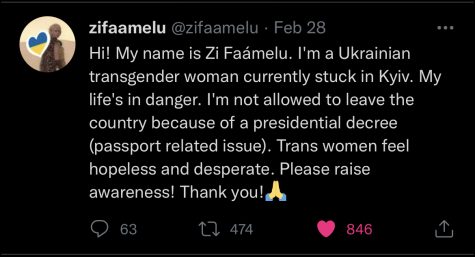Struggles of Transgender Women in Ukraine
March 10, 2022
The current attacks in Ukraine have tremendously affected transgender women who are incredibly underrepresented in the current media coverage of the crisis.
Transgender women in Ukraine are not able to flee the country if their passport does not align with their gender. This is due to the fact that trans women 18-60 years old (fighting age in Ukraine) with a male gender marker on their passport are forced to stay in the country as potential recruits as per orders of a presidential decree. Due to the martial law enacted in the country, Ukrainian men, and any citizen with a male gender mark on their documents, are banned from leaving the country.
Evacuation priority is given to women and children. This has added to the trauma families are facing because not only are they fleeing for their lives, but also forced to break apart. Transgender women are not even being given the opportunity to flee the country, however. Junior Deanna Gaber expresses, “I understand why they might enact martial law seeing as this is a state of emergency, but I feel as though trans women need to be given the choice to fight or to flee.”
Trans Ukrainian singer, Zi Faámelu, described the struggle as a “war within a war.” She has stayed hiding in her apartment in Kyiv as missiles and violence get closer and closer. Faámelu expressed to CBS News how she is scared to leave her apartment not only due to fear of Russian attacks, but also fear of getting hate-crimed. As tensions rise, and more people arm themselves for protection, violence is increasing and Faámelu fears that this violence could easily turn transphobic. On February 28th, she tweeted: “Hi! My name is Zi Faámelu. I’m a Ukrainian transgender woman currently stuck in Kyiv. My life’s in danger. I’m not allowed to leave the country because of a presidential decree (passport related issue). Trans women feel hopeless and desperate. Please raise awareness! Thank you!”
in her apartment in Kyiv as missiles and violence get closer and closer. Faámelu expressed to CBS News how she is scared to leave her apartment not only due to fear of Russian attacks, but also fear of getting hate-crimed. As tensions rise, and more people arm themselves for protection, violence is increasing and Faámelu fears that this violence could easily turn transphobic. On February 28th, she tweeted: “Hi! My name is Zi Faámelu. I’m a Ukrainian transgender woman currently stuck in Kyiv. My life’s in danger. I’m not allowed to leave the country because of a presidential decree (passport related issue). Trans women feel hopeless and desperate. Please raise awareness! Thank you!”
In order for transgender individuals to change their gender on their passport in Ukraine, they needed a diagnosis up until 2017; this included being required to spend at least a month in a psychiatric hospital so “a board of mental health professionals could make the diagnosis,” among other steps to change their gender on legal documents. This perpetuated the idea that being queer, and especially being transgender, is a psychiatric disorder. This requirement remains today, as a diagnosis through outpatient appointments is still required in Ukraine for transgender individuals.
For the time being, people like Faámelu, remain optimistic that they will find a way to flee the country. She told CBS, “There’s something about Ukrainians, they are very optimistic and joyful people… They never give up.”
















